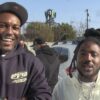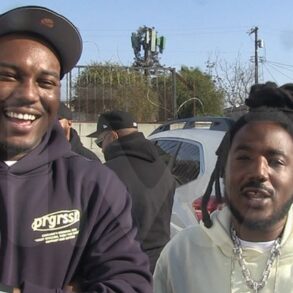The first time I ever heard a Luh Bri song, I was hanging with my friends and Spotify shuffled the song “Roxk Out” into the playlist. In between the dancing and the loud chants of “ayes,” I looked up the artist’s name. Luh Bri’s music is reminiscent of drill, a hip-hop subgenre, but with a southern dialect. At the first piano note and beat drop, I remember thinking to myself, “Luh Bri … she’s up next.”
Three years later, I caught up with rapper Luh Bri in Washington, D.C. while she was on tour with DJ Ty Pack for the “Who Really Rapping Fest.” While attending her show, she turned the crowd up with her performance and was arguably the best act of the night. Our conversation preceding the show was equally as lit.
“I’m a street rapper but I’m versatile,” she said. “You might hear me sing, you might hear me rap … it’s whatever.”
With her reserved nature, it is almost a surprise when she chops up the beat with her crisp flow. She dedicates the majority of her time to her craft, dropping songs like “Motion” (2023), “Poppin My Sh—” (2020) and “Wateva Wassuh ft. Big Mali” (2020). She attributes her unique sound to her upbringing in Mount Gilead, North Carolina, a close-knit community that has bootlegs on Saturdays and prays on Sundays.
The beats are the epitome of trap music and she comes with a hard cadence of lyrically layered vocals. She explained how her community’s support fuels her musical expression.
“My brother was the one that pushed me to start rapping,” Luh Bri said. “I used to just listen to beats on YouTube and just write.”
”Outside of music, I am a full-time mother,” she added, “so if I’m not working, in the studio, or on the road, I’m at home with my child or with my mama. If my child is with my mama then I’m probably outside, having a good time and enjoying myself … And my city is small so … either we at a bootleg or we’re at my cousin’s house playing cards, rolling dice, and people on the back of their trunk with their bottles and stuff.”
She continued to talk about the village that influences her music with a grin on her face.
”Today was Sunday,” Luh Bri said. “I stopped by the church and my uncle prayed for me before I hit the road. So, it was just a family thing … we love each other.”

Garion Mangum
That family-oriented lifestyle has helped her grow as she navigates life with music and motherhood.
”As I look back, I feel like I’ve definitely developed,” Luh Bri said. “I still do like rolling dice and you know, being posted up in the ‘hood but I can say like my demeanor has changed. My mindset has changed especially after I had my child. I can’t just go where I want — I have to be in the studio making music.”
Rapping since the age of 14, Luh Bri remembers her mother’s taste in music playing a major role in shaping her own.
“I would say my early influences would be people that my mother used to listen to,” she said. “Nicki Minaj was definitely one … Eve, Erykah Badu, and Missy Elliott … ”
Now, being an influential female rapper today, she is ready for her music to gain the traction that she believes it deserves.
“The opportunities that we have today in the rap industry are out of this world,” Luh Bri said. “Females are coming out of the woodwork. Whatever they are doing now to get the females mainstream, they’re doing it right because the females are now being heard. So, they need to bring that over here.”
She advises other female rappers to be tenacious and hopes to leave an impact on her beloved hometown community.
“I want to be the one to inspire (folks in Mount Gilead) to chase their dreams and don’t ever give up,” Luh Bri said.
This post was originally published on this site be sure to check out more of their content.








